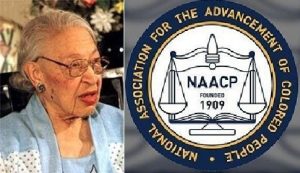Enolia Pettie McMilllan
The daughter of a former slave, a civil rights activist and educator, she achieved a lifetime of “firsts”.
(October 20, 1904 – October 24, 2006)

Enolia Pettie McMillan was an educator, civil rights activist, and community leader and the first female national president of the NAACP. She was born Enolia Virginia Pettie in Willow Grove, Pennsylvania, the daughter of Elizabeth Fortune Pettie and John Pettie, the latter a former slave.
When she was three years old, the family moved to Maryland in search of improved educational opportunities. Enolia Pettie attended Frederick Douglass High School in Baltimore, Maryland. Later, with a Alpha Kappa Alpha scholarship – the first of its kind- she attended Howard University in Washington, D.C. She commuted to school for four years because she was unable to pay the cost of board and lodging. She graduated with a Bachelor of Arts in Education in 1926. In 1927 she began her teaching career at Denton High School in Caroline County, Maryland. In 1928, she became a principal in Charles County.
Later in her career, Enolia became president of the Maryland State Colored Teachers’ Association and regional vice-president of the National Association of Colored Teachers. After the 1954 Brown v. Board of Education ruling outlawing segregated public schools, she was one of the first Black teachers at a white school.
McMillan received a master’s degree in 1933 from Columbia University. While at Columbia she began to question the Maryland public education system. She used the topic for her master’s thesis entitled, Some Factors Affecting Secondary Education for Negroes in Maryland Counties (Excluding Baltimore). The thesis attacked Maryland’s racist dual school system in the 1930s. She found that the system provided unequal school terms, salary scales and curricula. She retired from teaching in 1968.
In 1969, she defeated Juanita Mitchell to become president of the Baltimore branch of the NAACP. In 1984, she became the first woman to be elected national president of the NAACP. She held the position until 1990. The role at the time was ceremonial, but McMillan had considerable influence on the organization’s policies and operations. Along with former NAACP Executive Director Benjamin Hooks, she is credited with organizing the NAACP’s move from New York to Baltimore in 1986. She continued her work in education as the first female president of the Board of Regents of Morgan State University.
“Mrs. McMillan grew from humble beginnings to become a woman who made the most profound difference in the lives of African Americans in Baltimore and across Maryland.” stated Morgan President David Wilson, March 29.2017 in a ceremony honoring Enolia Pettie McMillan.
Additional Resources
Maryland State Archives, Maryland Women’s Hall of Fame. Biographies – Enolia Pettigen McMillan (maryland.gov)
Morgan State https://www.morgan.edu/news/remembering-baltimore-civil-rights-icon-enolia-mcmillan
“Enolia P. McMillan — first woman named NAACP president”. 27 October 2006. Retrieved 2015-05-06.
The Crisis Publishing Company (2012). The Crisis. The Crisis Publishing Company Inc. Retrieved 2015-05-06.